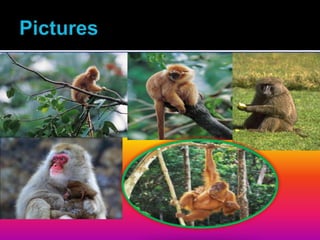Monkeys
- 2. The monkey is one of the most intelligent of all animals there are about 130 different divided into two major groups new world monkeys and old world monkeys. The monkeys found in south and Central America are known as new World monkeys and those of Africa and Asia are known as old world monkeys.
- 3. New world monkeys have broad nose , while old world have narrower nose. Monkeys are arboreal animals. They have excellent eyesight and use their hands and feet to swing from the branches of trees . Some monkeys, such as the spider monkey of south Africa use their tail as a extra hand
- 4. ïĄ Monkeys have long arms and legs which help Them climb , run , and jump amidst Trees . they walk and run on all four Limbs . monkeys have large eyes and Heavy jaws .
- 5. Old world monkeys have Opposable thumbs , meaning that they Can place their thumb opposite any other finger to grasp small things . New World monkeys have partially Opposable or no thumbs at all
- 6. Mandrill is one of the largest monkeys . They have large , grayish brown body measuring about 1.8 in length . Mandrills are omnivores but they mainly eat plants . They live in tropical forests of Cameron and Gabon in western Africa There are many types monkeys or apes gorillas , Chimpanzees ,and banobos are other great apes.
- 7. ïĄ Monkeys feed on anything including flowers, fruits , grass , leave , roots , nuts , insects, birds , and their and their eggs and lizards . Languor mainly eat grass.
- 8. Orgutans mainly eat mangos and and figs sometimes but can sometimes survive on leaves , barks and soils . The scientific name of orgutan , pongo pygameus it comes from a sixteenth century story by British sailor andrew battle , who was held prisoner by Portuguese in Angola . The people of Malaysia call orgutan â person of the forest alas his homes are being destroyed today . Lifespan of wild orgutan is 45-50 year and in captivity orgutan is 50-60 years











